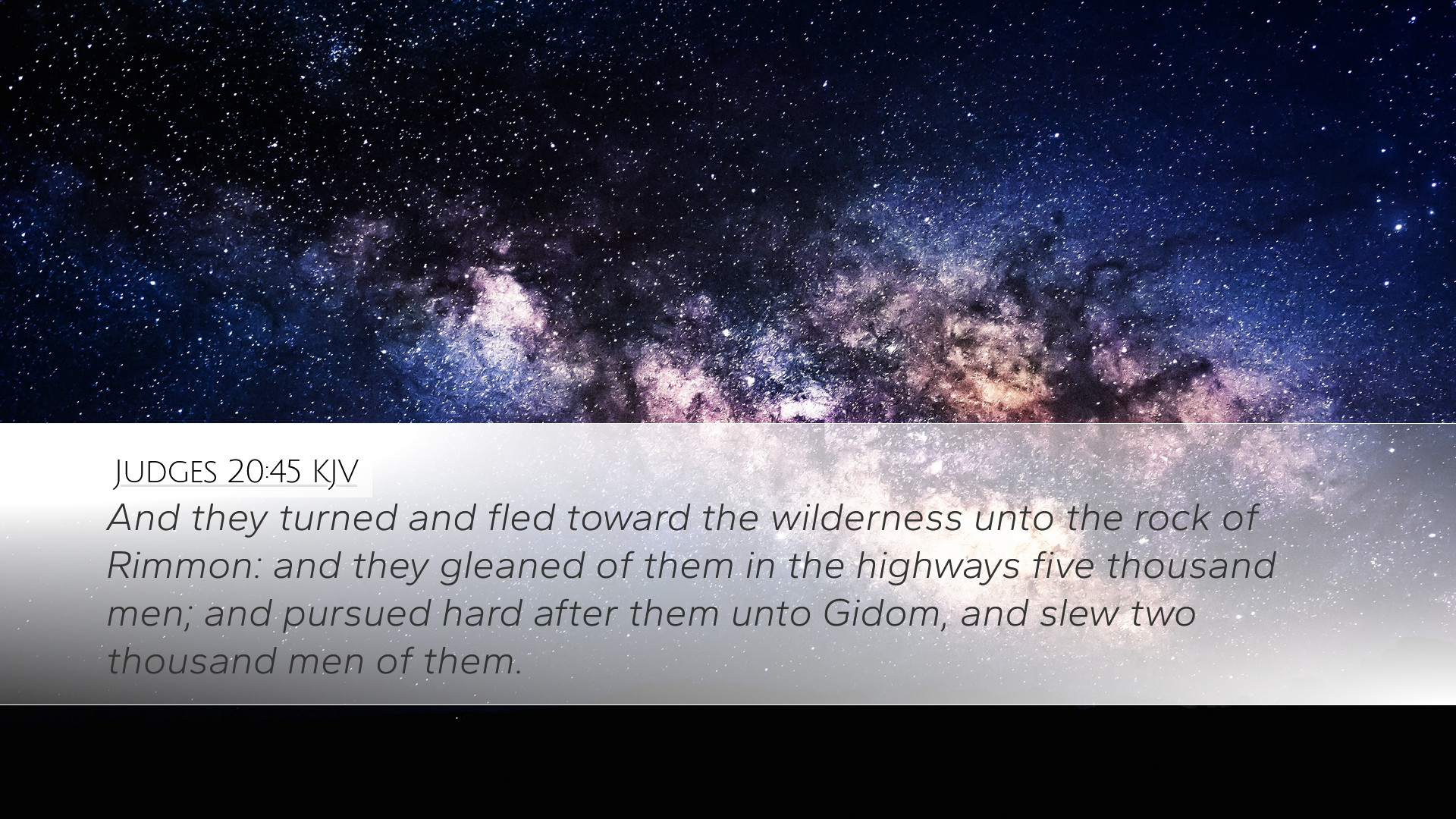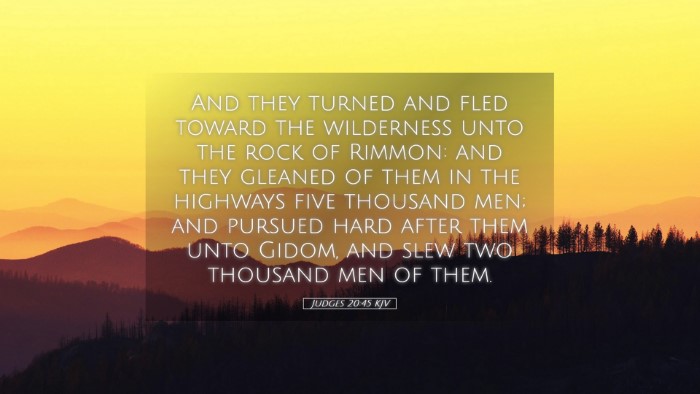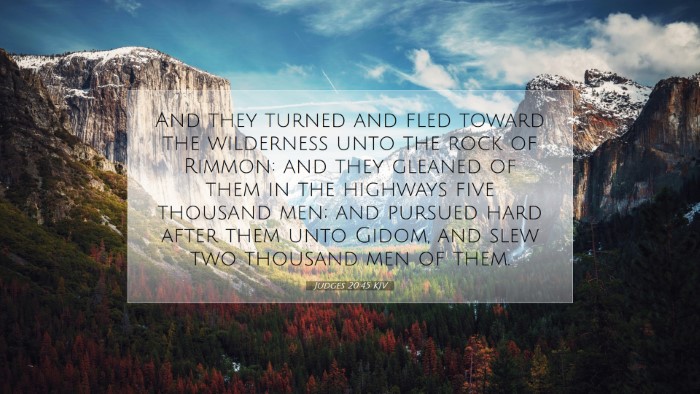Commentary on Judges 20:45
Judges 20:45 states: "And they turned and fled toward the wilderness unto the rock of Rimmon: and they gleaned of them in the highways five thousand men; and pursued hard after them unto Gidom, and slew two thousand men of them."
Contextual Overview
The narrative contained in the Book of Judges reflects a tumultuous period in Israel's history, marked by cycles of sin, oppression, repentance, and deliverance. Judges 20 specifically recounts the civil conflict initiated by the Levite's concubine's death, which catalyzed a unified response from the tribes of Israel against the tribe of Benjamin. This passage, Judges 20:45, captures the dire consequences of war and the brutality that ensued.
Exegetical Insights
The verse highlights two critical components of the aftermath of battle: the flight of the remaining Benjaminite soldiers and the pursuit by the Israelites. The fleeing men sought refuge in the wilderness, demonstrating the desperation of their plight. The mention of Gidom signifies the broader conflict's geographic scope and emphasizes the relentless pursuit that continued after initial skirmishes.
Analysis from Matthew Henry
Matthew Henry emphasizes the judgment of God upon the tribe of Benjamin which resulted from their obstinate defense of wickedness. He notes that their flight into the wilderness symbolizes a movement away from God's presence, illustrating how sin leads to destruction. Henry also points out that the Israelites' zeal in pursuing the Benjaminites serves as a crucial element in understanding the severity of sin's consequences.
Insights from Albert Barnes
Albert Barnes provides further explanation regarding the location of the events that transpired in Judges 20:45. He explains that the Rock of Rimmon served as a stronghold, a place of refuge in times of conflict. The five thousand men gleaned by the Israelites reflect a calculated effort in the fight against Benjamin, illustrating the gravity of Israel’s intent to eradicate evil among their ranks. Barnes recognizes the number of slain in this verse, interpreting it as a moment of divine judgment against Benjamin and reflective of the societal consequences of allowing such sins to proliferate unchecked.
Perspectives from Adam Clarke
Adam Clarke elaborates on the geographical and socio-political implications of this verse. He remarks that Gidom was a crucial point in the choreography of this violence, highlighting the warfare’s strategy and the logistical challenges faced by the armies. Clarke notes that the brutality encapsulated in the shedding of blood reflects the severe measures Israel felt were necessary to address the transgression that had provoked this civil war, thus offering a sobering reflection on the nature of communal sin and justice.
Theological Reflections
This verse and its surrounding context prompt significant theological reflection regarding divine justice, community accountability, and the gruesome realities of conflict. The Israelites’ actions, while justified in their pursuit of righteousness, also raise questions about the moral implications of their total war approach. It illustrates that even within the community of faith, sin can lead to devastating consequences not only for the individual but for the entire collective body.
Consequences of Apathy towards Sin
The prolonged struggle against Benjamin teaches modern readers about the dangers of allowing sin to fester unchecked within a community. Unity against wickedness was essential for Israel; yet, the method in which they pursued this unity—through bloodshed and conflict—calls for serious reflection on the balance between judgment and mercy in ecclesial practices today.
Reminders of Redemption
While Judges does not end with a redemptive note, these reflections serve as reminders that God’s overarching plan involves restoration and reconciliation. Even amidst the harsh penalties meted out against sin, the hope remains that societal structures can be rebuilt on principles of love, mercy, and justice that ultimately reflect the character of God.
Practical Application for Pastors and Theologians
- Call for Vigilance: Encourage congregations to remain vigilant against sin within the church community, promoting accountability and openness in addressing sins that could threaten communal sanctity.
- Emphasize Redemption: Amid discussions on sin and judgment, it is crucial to pivot towards the message of hope and redemption found in Christ, reminding the community of God’s heart for restoration.
- Wariness in Conflict: Reflect on the methods of confronting sin, urging a balance of righteous zeal and grace in seeking resolution, advocating for restoration rather than destruction.
Conclusion
Judges 20:45 serves as a stern warning regarding the devastating consequences of communal sin and the extreme measures that can ensue when a society turns from righteousness. By integrating insights from esteemed commentators, we see the complexity of this passage unfold, offering rich material for understanding the nature of sin and its effects on a faith community. It necessitates an ongoing dialogue concerning justice, mercy, and the ultimate hope we have through Christ.


